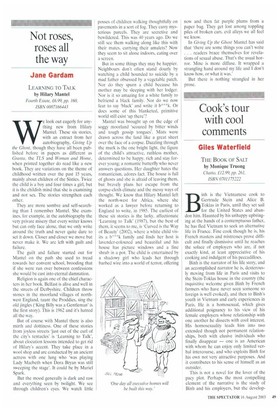Not roses, roses all the way
Jane Gardam
LEARNING TO TALK by Hilary Mantel Fourth Estate, £6.99, pp. 160, ISBN 0007166443 We look out eagerly for anything new from Hilary Mantel, These six stories, with an extract from her autobiography, Giving Up the Ghost, though they have all been published before in papers as different as Granta, the TLS and Woman and Home, when printed together do read like a new book. They are variations on the theme of childhood written over the past 15 years, mainly about children of the Sixties. Twice the child is a boy and four times a girl, but it is the childish mind that she is examining and not sex. The stories strengthen each other.
They are more sombre and self-searching than I remember Mantel. She examines, for example, in the autobiography the very private misery that every writer knows but can only face alone, that we only write around the truth and never quite dare to set it down. Closer and closer we move but never make it. We are left with guilt and failure.
The guilt and failure started out for Mantel on the path she used to tread towards her convent school, brooding that if she were run over between confessions she would be cast into eternal damnation.
Religion is again one of the chief characters in her book. Belfast is alive and well in the streets of Derbyshire. Children throw stones in the moorland villages of northwest England, taunt the Proddies, sing the old jingles (King Billy was a Gentleman' is the first story). This is 1962 and it's hatred all the way.
But of course with Mantel there is also mirth and dottiness. One of these stories from joyless streets 'just out of the curl of the city's tentacles' is 'Learning to Talk', about elocution lessons intended to get rid of Hilary's accent. They take place in a wool shop and are conducted by an ancient actress with one lung who 'was playing Lady Macbeth when Dora Bryan was still sweeping the stage'. It could be by Muriel Spark.
But the mood generally is dark and raw and everything seen by twilight. We see through children's eyes. We watch little posses of children walking thoughtfully on pavements in a sort of fog. They carry mysterious parcels. They are secretive and bewildered. This was 40 years ago. Do we still see them walking along like this with their mates, carrying their amulets? Now they seem to sit alone indoors, eating over a screen.
But in some things they may be happier. Neighbours don't often stand dourly by watching a child hounded to suicide by a mad father obsessed by a vegetable patch. Nor do they spurn a child because his mother may be sleeping with her lodger. Nor is it so amazing for a white family to befriend a black family. Nor do we now fear to say 'black' and write it b***k. Or does some of this blanketed, primitive world still exist `up there'?
Mantel was brought up on the edge of soggy moorland 'scoured by bitter winds and tough gossip tongues'. Mists were drawn across the land like a great sheet over the face of a corpse. Dazzling through the murk is the one bright light, the figure of the child's attractive, ruthless mother, determined to be happy, rich and stay forever young; a romantic butterfly who never answers questions. Her daughter hates the romanticism, adores fact. The house is full of ghosts and she is afraid of leaving them, but bravely plans her escape from the corpse-cloth climate and the messy ways of thought. We know that Hilary Mantel left the north-west for Africa, where she worked as a lawyer before returning to England to write, in 1985. The earliest of these six stories is the larky, affectionate 'Learning to Talk' (1987), but the best of them, it seems to me, is 'Curved is the Way of Beauty' (2002), where a white child visits a hk family and finds her host is lavender-coloured and beautiful and his house has picture windows and a fine shrub in a pot. The child is entertained by a shadowy girl who leads her through barbed wire into a world of terror, offering now and then fat purple plums from a paper bag. They get lost among toppling piles of broken cars, evil alleys we all feel we know.
In Giving Up the Ghost Mantel has said that 'there are some things you can't write . . . readers brace themselves for revelations of sexual abuse. That's the usual horror. Mine is more diffuse. It wrapped a strangling hand around my life and I don't know how, or what it was.'
But there is nothing strangled in her prose.










































































 Previous page
Previous page